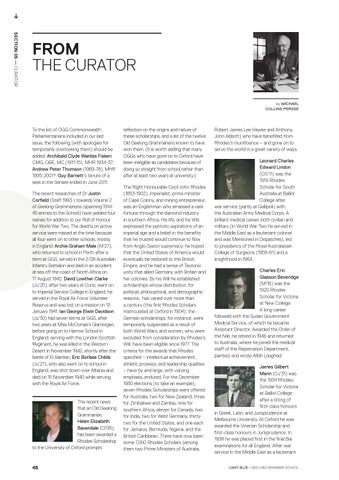↓ SECTION 05 — CURATOR
FROM THE CURATOR by MICHAEL COLLINS PERSSE
To the list of OGG Commonwealth Parliamentarians included in our last issue, the following (with apologies for temporarily overlooking them) should be added: Archibald Clyde Wanliss Fisken CMG, OBE, MC (1911-15), MHR 1934-37; Andrew Peter Thomson (1969-78), MHR 1995-2001*. Guy Barnett’s tenure of a seat in the Senate ended in June 2011. The recent researches of Dr Justin Corfield (Staff 1993-) towards Volume 2 of Geelong Grammarians (spanning 191445 entries to the School) have yielded four names for addition to our Roll of Honour for World War Two. The deaths on active service were missed at the time because all four went on to other schools, mostly in England. Archie Graham Male (M’27), who returned to school in Perth after a term at GGS, served in the 2/28 Australian Infantry Battalion and died in an accident at sea off the coast of North Africa on 17 August 1942. David Lowther Clarke (Ju’25), after two years at Corio, went on to Imperial Service College in England; he served in the Royal Air Force Volunteer Reserve and was lost on a mission on 13 January 1941. Ian George Elwin Davidson (Ju’30) had seven terms at GGS, after two years at Miss McComas’s Glamorgan, before going on to Harrow School in England; serving with the London Scottish Regiment, he was killed in the Western Desert in November 1942, shortly after the battle of El Alamein. Eric Borlase Childs (Ju’27), who also went on to school in England, was shot down over Albania and died on 15 November 1940 while serving with the Royal Air Force.
The recent news that an Old Geelong Grammarian, Helen Elizabeth Baxendale (Cl’06), has been awarded a Rhodes Scholarship to the University of Oxford prompts
46
reflection on the origins and nature of these scholarships, and a list of the twelve Old Geelong Grammarians known to have won them. (It is worth adding that many OGGs who have gone on to Oxford have been ineligible as candidates because of doing so straight from school rather than after at least two years at university.) The Right Honourable Cecil John Rhodes (1853-1902), imperialist, prime minister of Cape Colony, and mining entrepreneur, was an Englishman who amassed a vast fortune through the diamond industry in southern Africa. His life, and his Will, expressed the patriotic aspirations of an imperial age and a belief in the benefits that he trusted would continue to flow from Anglo-Saxon supremacy: he hoped that the United States of America would eventually be restored to the British Empire, and he had a sense of Teutonic unity that allied Germany with Britain and her colonies. By his Will he established scholarships whose distribution, for political, philosophical, and demographic reasons, has varied over more than a century (the first Rhodes Scholars matriculated at Oxford in 1904): the German scholarships, for instance, were temporarily suspended as a result of both World Wars; and women, who were excluded from consideration by Rhodes’s Will, have been eligible since 1977. The criteria for the awards that Rhodes specified – intellectual achievement, athletic prowess, and leadership qualities – have by and large, with varying emphasis, endured. For the December 1980 elections (to take an example), seven Rhodes Scholarships were offered for Australia, two for New Zealand, three for Zimbabwe and Zambia, nine for southern Africa, eleven for Canada, two for India, two for West Germany, thirtytwo for the United States, and one each for Jamaica, Bermuda, Nigeria, and the British Caribbean. There have now been some 7,000 Rhodes Scholars (among them two Prime Ministers of Australia,
Robert James Lee Hawke and Anthony John Abbott) who have benefited from Rhodes’s munificence – and gone on to serve the world in a great variety of ways. Leonard Charles Edward Lindon (OS’11) was the 1919 Rhodes Scholar for South Australia at Balliol College after war service (partly at Gallipoli) with the Australian Army Medical Corps. A brilliant medical career, both civilian and military (in World War Two he served in the Middle East as a lieutenant-colonel and was Mentioned in Dispatches), led to presidency of the Royal Australasian College of Surgeons (1959-61) and a knighthood in 1964. Charles Eric Glasson Beveridge (M’16) was the 1920 Rhodes Scholar for Victoria at New College. A long career followed with the Sudan Government Medical Service, of which he became Assistant Director. Awarded the Order of the Nile, he retired in 1946 and returned to Australia, where he joined the medical staff of the Repatriation Department, painted, and wrote Allah Laughed. James Gilbert Mann (Cu’31) was the 1934 Rhodes Scholar for Victoria at Balliol College after a string of first-class honours in Greek, Latin, and Jurisprudence at Melbourne University. At Oxford he was awarded the Vinerian Scholarship and first-class honours in Jurisprudence. In 1938 he was placed first in the final Bar examinations for all England. After war service in the Middle East as a lieutenant LIGHT BLUE - GEELONG GRAMMAR SCHOOL
